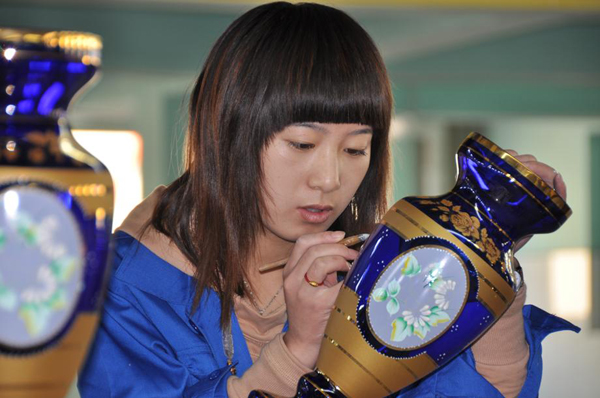 |
|
An artisan gives final touches to a vase at Honghai Glassware Co Ltd in Qixian, Shanxi province, which makes high-end products FAN HEPING / FOR CHINA DAILY |
Local companies in Qixian ride orders from summit to rebound from recent downturn
This year's G20 Leaders Summit in Hangzhou not only brought more fame to its host city but also set the spotlight on the more remote county of Qixian, located in central Shanxi province.
Those who have some knowledge of Qixian may have learned about it from Zhang Yimou's film Raise the Red Lantern, which was shot in the renowned Qiao Family Compound. But Qixian is also known for something else: its glassware.
All the glassware-including the wine and water glasses-used during the G20 Summit in September were produced by Tianjiu Glassware Co Ltd.
According to its general manager, Lyu Gui, the company was chosen over seven competitors to provide the State banquet during the G20 Summit with more than 40,000 products in 15 different patterns. These included red wine goblets and tea sets.
"As soon as we were assigned the design and production job by the organizing committee of the G20 Summit, we set up a special design team and worked on our plan dozens of times," said Lyu.
"You can say we gave full play to the handblown glass techniques of Qixian glassware developed over the last 60 years."
Word about the G20 job spread rapidly and orders for Qixian glassware multiplied. Not only Tianjiu but the other companies in the county saw their orders rise, leading to some of the popular products selling out.
According to Hu Xiaofeng, director of the Qixian Glassware Industry Development Center, the G20 summit signaled another important turning point for the local glassware sector. Prior to that, eight years ago, the local companies and the government had already begun to revive the traditional industry, after it was hit by fallout from the global financial crisis.
Before that, the industry had expanded considerably with the number of glassware manufacturers jumping from 41 in 1998 to 160 one decade later.
Hu said the local government had not been disheartened by the difficulty of the task to revive the industry, but rather seized on the opportunity to restructure it. Companies were merged to make those left more competitive.
The reshuffle worked. The 38 glassware companies in the county reported total annual output last year worth 2.1 billion yuan ($305 million), up from 1.4 billion yuan in 2008. About 45 percent of the handblown glassware produced in China last year came from Qixian.
Companies have also come to understand that only high-end products with high quality can win in the marketplace.
"Craftsmanship is what we value the most in our work," said Tianjiu's Lyu.
"A company can only stand out against the stiff competition with world-class products, brand image building and product innovation. It is our goal to make Tianjiu a national industrial brand," Lyu added.
With that idea in mind, glassware companies in Qixian have been working harder to improve their product quality. Brands such as Dahua and Hongyi have been recognized as national trademarks by the Trademark Office of the State Administration for Industry and Commerce.
Qixian's glassware companies have been attaching great importance to overseas markets, after having first entered the international market in the 1980s.
Currently 50 percent of its glassware are sold to the United States, 30 percent to Europe and the rest sold to South Africa, the Middle East, South Asia, Southeast Asia, Canada and Australia.
But to offset the impact of the stagnant economy in these overseas markets, Qixian glassware companies have been expanding their activities in China, targeting the wholesale markets in Shanghai, Guangzhou and Yiwu.
The local government has also been promoting a new rural e-commerce program with Alibaba, setting up a special Qixian store on the platform to win more consumers.
While Qixian's glassware industry has entered a new phase of development, problems still exist.
To further stimulate its development, the local government implemented a number of favorable policies on tax, land use and financing. Construction of a glassware culture park has started in Qixian, aiming at attracting tourists.
The local government also invested 120 million yuan ($17.4 million) to set up an international glassware school with Diablo Glass School from Boston.